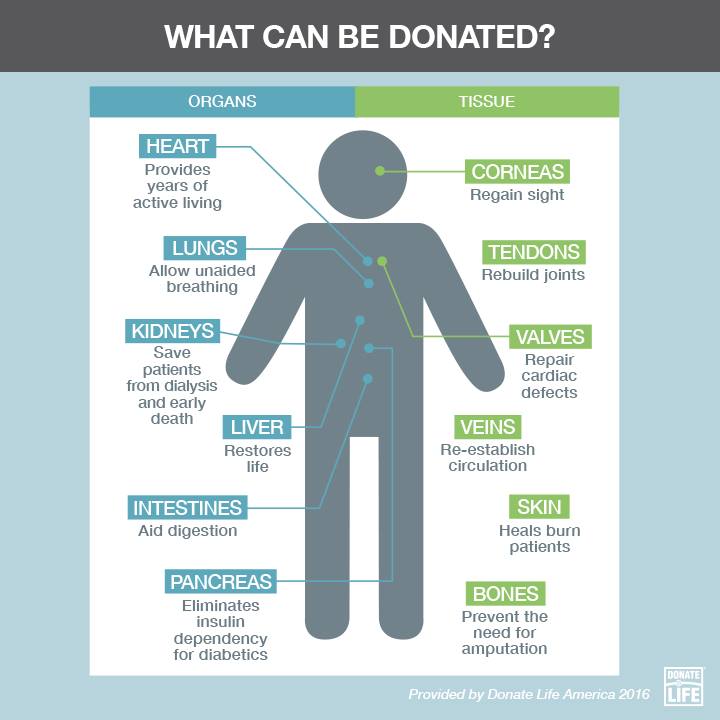About Donation
What is organ, eye and tissue donation?
Organ, eye and tissue donation is the process of recovering organs, eyes, and tissues from a deceased person and transplanting them into others in order to save the lives or improve the health of those in need. Up to eight lives can be saved through organ donation, and another 75 lives or more may be improved through tissue donation.
How many people need donated organs and tissue?
There are currently more than 100,000 people in the U.S. waiting for organ transplants. Each year, approximately 8,000 people die waiting for an organ transplant that would have given them a second chance at life. Additionally, each year hundreds of thousands of people benefit from donated tissue that is used for life-saving and reconstructive purposes, and corneas that restore sight.
What organs and tissues may be donated?
The most commonly transplanted organs are the kidneys, liver, heart, and lungs. In recent years, success has been achieved in curing diabetes with a pancreas transplant or extracting and transplanting islet cells from the pancreas that produce insulin. Although only a small number of intestinal transplants have been performed, this treatment holds great hope for patients whose intestines have been severely damaged through illness, trauma or birth defects. Sometimes the stomach is also recovered and transplanted at the same time. Commonly recovered and transplanted tissues enhance the lives of many who suffer from traumatic injury or disease:
- Skin is used as a temporary dressing for burns, serious abrasions and other exposed areas.
- Bone is used in orthopedic surgery to facilitate healing of fractures or to prevent amputation.
- Heart valves are used to replace defective valves, often in children.
- Tendons are used to repair torn ligaments on knees or other joints.
- Veins are used in cardiac bypass surgery.
- Corneas can restore sight to the blind.
- Many tissues that cannot be used for transplant can be recovered and used in a variety of research studies to advance medical science.
Will I really make a difference?
Yes. Donation saves lives every day. Hundreds of Virginians have organ transplants each year and receive a second chance at life. Approximately two citizens in the Commonwealth die every week waiting for the gift of an organ that does not come.
How can one person save 8 people?
By becoming an organ, eye and tissue donor at DonateLifeVirginia.org one person can donate a heart, two parts of a liver, two kidneys, two lungs, intestine and a pancreas. One tissue donor can enhance the lives of more than 75 people.
What is a living donation?
Living donation is when a living person donates an organ or part of an organ to another person. The living donor may be a relative, friend, spouse, or an in-law. Or, the donor may be a stranger that has volunteered to help someone else. Living donation usually involves one of these organs: a segment of the liver, the lobe of one lung, a kidney, or a portion of the pancreas. Living donation is an alternative for individuals awaiting organ transplantation from a deceased donor. You can find more information on living donation here.
Does my family have to pay for the donation?
No. Donation costs nothing for the donor or the donor’s family. While the family will receive a hospital bill for any lifesaving efforts that took place for their family loved one, if that patient dies and becomes a donor, all charges related to the donation process are billed to the organ, eye or tissue recovery agency.
Will my family still have the final decision?
No. Your decision to be a donor will be honored. The Code of Virginia states that family permission is not required when you have documented your decision to donate. While it is still helpful for family members to know what you want, their permission will be sought only if your decision is not registered, either through the Virginia DMV or online at DonateLifeVirginia.org. Those under the age of 18 can indicate their wishes to donate, but parents and guardians by law must make that decision.
What about funeral arrangements?
There can be an open casket funeral, viewing or other standard memorial after donation. The donor is treated with utmost respect and dignity. The recovery of organs and tissues is conducted under standard, sterile conditions in an operating room, and the body is fully reconstructed once organs and tissues are removed. The family will make the funeral arrangements in the usual fashion. All funeral costs remain the responsibility of the family. Any costs that may be associated with donation are paid for by the organ, eye or tissue recovery agency.
How can my organs and tissues be used for research?
Organs and tissues that are not recovered for transplant may be used for medical research if the donor (or family, in lieu of a Donor Registry record) authorizes it. Non-transplantable organs and tissues help researchers every day find new ways to treat disease. A gift of organs and tissues for research can affect untold numbers of patients who benefit from the medical advances that result from their use in the laboratory. Virtually every disease that plagues mankind is being studied today with the help of donated human organs and tissues that cannot be transplanted.
How can I list what organs and tissues I have decided to donate?
Donated organs and tissues may be used for the purpose of transplantation, research, education or therapy. You cannot specify at the time you register at the Virginia DMV. That process simply puts the heart on your driver’s license and puts your general donation decision in the Virginia Donor Registry. The Uniform Anatomical Gift Act specifies that the Registry will give you the option to decide which organs and/or tissues will be used for each purpose. If you register your decision at DonateLifeVirginia.org, you can specify your donation.
If you have registered at the Virginia DMV, you may go here, enter your information, and then specify your donation decisions.
If I donate my organs, will the recipients know who my family is?
The identity of all parties is kept confidential until both parties agree to release identifying information to the other. The donor family and the transplant recipient may receive such information as age, gender, and state of residence. Individually, the recipient may be told the circumstances of death, and the donor family may be informed of the transplants that were performed and receive feedback on how the health and lives of the recipients have improved. The organ, eye and tissue recovery agencies facilitate correspondence and meetings initiated by either the donor family or the recipient at any time, but only if both parties agree to it.

